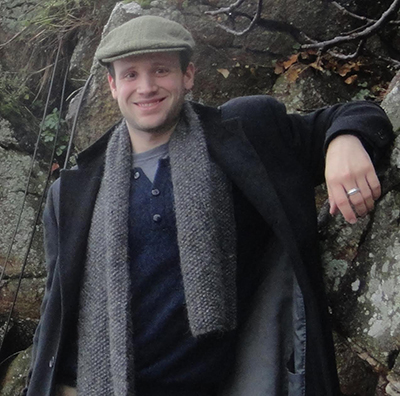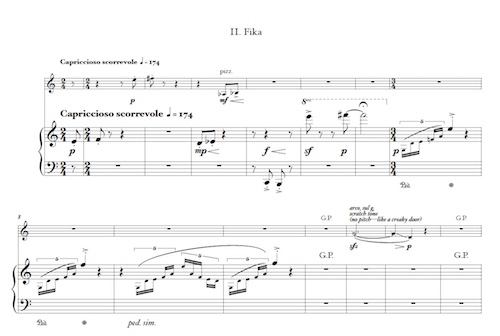by Daniel Hathaway

In a telephone conversation from New York, where he teaches at the Juilliard School, Fein noted that he’s known Andrew Sords for years — the composer grew up in Richmond Heights and he and the violinist were in the same class at the Cleveland Institute of Music. Fein wrote a piece for Sords as his senior thesis, and years later, Sords commissioned Untranslatable, which Fein completed last summer.
I asked him where he got the idea for that title.
“I’m a little susceptible to clickbait articles, especially if they’re about travel or languages, which are two of my extra-musical passions,” he said. “I saw an article, maybe on Buzzfeed, about a list of 25 words that don’t have English equivalents, so I had to have a look. I thought, what an alluring idea that in some cultures a single word can express a complex state of emotion or circumstances. So I picked three of my favorites and wrote a movement about each.”
Notes in the preface to Fein’s score of the new sonata define those untranslatable words:
Forelsket – n. (Norwegian: for-elz-kut) The euphoria felt when first falling in love.
Fika – n. (Swedish: fee-kah) 1. A midday break taken for the purpose of drinking coffee, eating pastries, and socializing with colleagues. 2. v. To take such a break.
Hiraeth – n. (Welsh: hee-ryeth) A nostalgic longing for the past; grief or homesickness for a home to which return is impossible, or which perhaps never even existed.
Having known Andrew Sords for so long, Fein said of course he took the violinist’s musical personality into account when crafting the new piece. “Andrew is such a charismatic performer, and he specializes in grand, bold, striking pieces like the Sibelius and Tchaikovsky concertos. I gave him some appropriate gestures, like the end of the last movement which has the character of the sixths in the Sibelius. He also has a lovely cantabile, which is featured in the first movement.”
By way of advice, Fein suggests that attendees be on the lookout for his initials, E.F., which appear in every movement in different ways. And they should just enjoy the gestural idea in the second movement of two old friends gossipping and egging each other on.
Although Evan Fein has lived in New York for eleven years, his music has found its way to Cleveland on several occasions. “Two years ago, I wrote a piece for the University Circle Wind Ensemble on the retirement of Gary Ciepluch and the dedication of the Maltz Performing Arts Center. And in January, Corey Shotwell and Gerardo Teissonnière performed my Letzte Brief as a prelude to Schubert’s Winterreise at CIM,” he said. “People were intrigued to hear something new in front of something that’s so well-known, and it was fun to have permission to inhabit Schubert’s world.”
Fein spoke highly of his CIM compositional mentor, Margaret Brouwer. “She was — still is — interested in all the sounds an instrument can make, and in imaginative ways of using the acoustic properties of instruments. Her music is very colorful. She’s also keen on the idea of storytelling, and would suggest that students graph out each of their pieces visually so they could see what was going on.”
That’s advice that Evan Fein followed in writing Untranslatable. “I started with an abstract, conceptual phase, doing free writing in prose about the untranslatable words. Then I considered the dynamic between the violinist and pianist and started generating musical material — a melodic idea, a couple of harmonies. I analyzed what I liked and decided what I could build out of that and what I should reject. It was a question of ‘who’s in and who’s out.’”
Because Fein will be flying in on Sunday just in time for the concert, he’ll have to rely on technology to hear Sords and Izumida prepare the piece for its premiere. “Andrew and I have gone through some aspects of the violin part over the phone, but I’ll have to listen to rehearsals via Skype.”
Published on ClevelandClassical.com April 10, 2018.
Click here for a printable copy of this article




